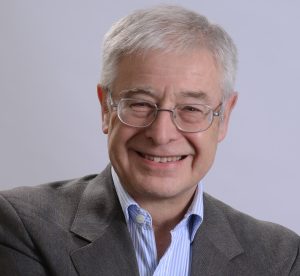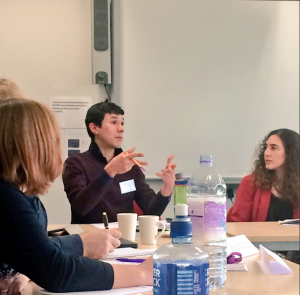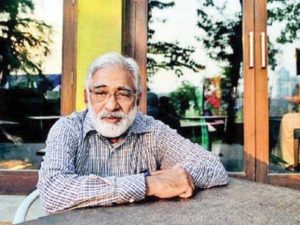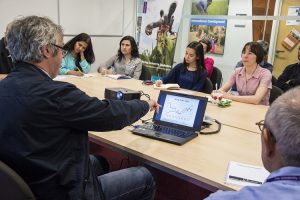Post-Brexit and Development: How to make the UK’s next trade regime development-friendly?
By Virgi Sari, PhD researcher at The Global Development Institute 
Following the vote to leave its natural trade partner, the EU, the British government is now faced with the challenging task of designing its new trade policies, including those with developing countries. The leading role of the UK in shaping global development through trade with developing countries is long established. As Brexit moves forward, the important question becomes: how will the UK maintain its legacy of using trade to contribute toward global development? How to construct new trade policy that is development friendly?
The Principles
On 26th October 2016, Professor Alan Winters of the University of Sussex delivered a lecture as part of the Global Development Institute Lecture Series on “Post-Brexit trade policy and development” . Winters highlighted some key principles, which can serve as a guide to devise UK’s new trade policy and brings its development-friendliness element. First and foremost, the UK government needs to recognize the heterogeneity of its developing country trading partners. While it is impractical to have a unique trade policy for each country, it is feasible to design the policies in clusters, from Least Developed Countries (development-led trade policy) to and the emerging economies of the BRICs (stronger trade-focus).
Winters also mentioned the new trade policy will likely be just trade policy, rather than more comprehensive foreign policy. As a result, the UK has to accept the fact it will lose its ability to influence the policies of developing countries, and of course, the EU too. The government should aim for a simple and pragmatic trade policy with developing countries, to achieve administrative efficiency and conserve the limited resources the government already has to spend on the Brexit related negotiation processes. read more…
Welcome to the Manchester Migration Lab!
 On Monday 5th December the University Of Manchester hosted it’s first Manchester Migration Lab workshop to identify and discuss the range and depth of work on migration being carried out by colleagues across a range of schools and institutes.
On Monday 5th December the University Of Manchester hosted it’s first Manchester Migration Lab workshop to identify and discuss the range and depth of work on migration being carried out by colleagues across a range of schools and institutes.
Following an in-depth scanning of current university research on migration 50 members of the staff and 20 PhD students were identified and invited to this session with convenors
At the first ever workshop, four key concepts and ideas were selected for discussion:
- Borders
- Journeys
- Agency
- Home
‘The Infiltrator’ versus ‘The Refugee’
GDI Lecture Series: Bangladesh Confronts Climate Change with David Hulme, Manoj Roy and Joseph Hanlon
On Wednesday, 7 December, Global Development Institute Executive Director, Professor David Hulme, Dr Manoj Roy (Lancaster University) and Dr Joseph Hanlon (Open University) discussed their new book: Bangladesh Confronts Climate Change. You can find the video and podcast from the event below and the book is available to purchase here.
The power of the sewing machine: A masterclass in building alliances for workers’ rights and sustainability in global production networks
By Aarti Krishnan and Corinna Braun-Munzinger, PhD researchers at the Global Development Institute
 The ESRC project on ‘Rising Powers, Labour Standards and the Governance of Global Production Networks’ and Global Production Networks, Trade and Labour research group at the Global Development Institute, University of Manchester, on 14 October 2016 hosted a talk by Karamat Ali, executive director of the Pakistan Institute of Labour Education & Research (PILER).
The ESRC project on ‘Rising Powers, Labour Standards and the Governance of Global Production Networks’ and Global Production Networks, Trade and Labour research group at the Global Development Institute, University of Manchester, on 14 October 2016 hosted a talk by Karamat Ali, executive director of the Pakistan Institute of Labour Education & Research (PILER).
“In life there are a few things worth doing, saving lives is one of them” read more…
Strange but possible: Has increased equality in the US played a role in Trump’s win?
 Professor David Hulme, Executive Director, Global Development Institute
Professor David Hulme, Executive Director, Global Development Institute
Interesting and alarming food for thought? And, yes. You read correctly. Could equality (not inequality and alienation) be the true crux of the matter when it comes to understanding the election of a multi-billionaire, member of the global elite to the White House?
In a refreshing and very alternative argument to the election post mortems of recent weeks, Nora Lustig – an economics professor and Director of the Commitment to Equity Institute at Tulane University – has suggested that perhaps more equality in three key dimensions may be feeding a greater sense of unfairness, indignation, and impotence than the increase in income and wealth inequality in the US.
We’re hiring Research Associates
Bina Agarwal at the Institute of Development Studies
Professor Bina Agarwal recently spoke at the Institute of Development Studies at Sussex University. She discussed the themes from Gender Challenges a three volume publication of essays from over the past 30 years. Professor Agarwal was joined by Professor Melissa Leach, IDS Director to discuss the key and emerging challenges to women empowerment will be. You can watch the discussion in full below.
Completing the AIDS shift? Taming a killer illness
Listen | Is the Islamic State Islamic? An Analysis of its Magazine, Dabiq with Professor Tim Jacoby
The first issue of Dabiq appeared in July 2014, the week after the Islamic State (ad-Dawlah al-Islamiyah – or simply ad-Dawlah to its citizens (Weiss and Hassan, 2015: xi)) captured Syria’s largest oilfield, with the announcement it had re-established the khilafah with the intention of returning Muslims’ ‘dignity, might, rights, and leadership’ (page 7). Since then, 14 more editions have followed in Spanish, German, Russian as well as English, constituting a corpus of 942 pages and over 400,000 words. A number of analyses of its content have now appeared. Some commentators, such as Celine Marie Novenario (2016), have, for instance, compared Dabiq to other militant magazines, while Brandon Colas (forthcoming) and Haroro Ingram (forthcoming) have considered respectively how it fosters its various potential audiences and a sense of in-group identity. While its “religious” content has generally been noted in these (as well as in the burgeoning literature on ad-Dawlah generally (Alexander and Alexander 2015; Gerges (2016); Stern and Berger (2015) etc.)), there are currently no studies seeking to understand Dabiq’s particular approach to Islamic exegeses and how this might connect with wider debates over the relationship between faith and violence. I seek to address this by focusing on three areas of Dabiq’s content (1) its reading of the Qur’an (2) its use of classical scholarship and (3) its engagement with contemporary readings of Islam.

